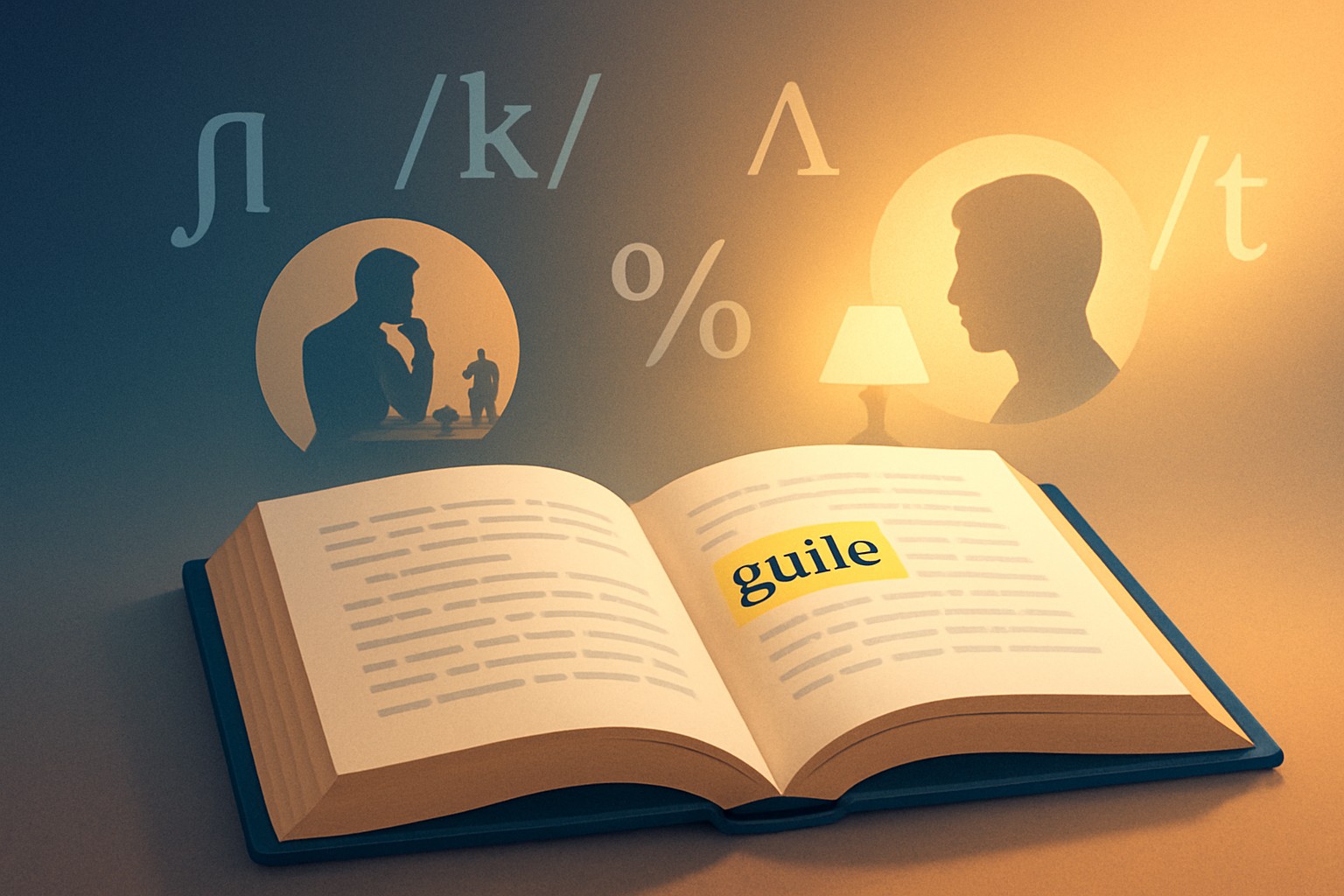
How to Pronounce Guile Correctly in English?


Many English learners and native speakers often pause when trying to pronounce guile correctly. This article clears up the mystery by breaking down the correct pronunciation and diving into the phonetic details while pointing out usual slip-ups.
What Does 'Guile' Mean and Why Should We Care About How It is Pronounced?
"Guile" refers to sly or clever intelligence, often with a dash of deceit tossed in to get what one wants. You’ll see it pop up in stories and everyday chat as a kind of smart trickery or crafty maneuvering.
How to Pronounce 'Guile' Like a Pro (Without Tripping Up)
The word "guile" is pronounced /\u0261a\u026al/. It starts with a firm "g" sound like in "go" then slides into the diphthong "ai." This sounds like the "i" in "mile". It wraps up with a softly but clearly enunciated "l."
- The first consonant sound (/ɡ/) is a hard g that’s made way back at the back of your mouth, kind of like the sound you get when you say go or gate. It’s firm and clear, no soft stuff here.
- The diphthong vowel sound (/aɪ/) is a bit of a two-step starting with an ah sound and smoothly sliding into an ee, just like how you say eye or high. It’s that quick little glide that gives the sound some character.
- The final consonant sound (/l/) is a soft but noticeable l, where your tongue casually rests against the roof of your mouth right behind your teeth. It’s subtle but makes all the difference in wrapping up the sound nicely.
Common Mispronunciations and How to Dodge Them Like a Pro
People often slip up on pronouncing "guile" by softening the 'g' to a 'j' sound or glossing over the diphthong. They end up with quirky versions like "jile," "gwill" or "gail."
- Pronouncing "guile" as "jile" swaps the sharp hard 'g' for a softer 'j' and flips the word on its head.
- Saying "gwill" adds an unnecessary 'w' after the 'g' that trips up the natural rhythm.
- Dropping the diphthong and saying "gail" smooths out the sound too much.
- Mixing up the pronunciation with "guilty" results in a clipped or awkward finish that misses the mark.
Dodge these slip-ups by tuning in closely to native speakers. Break the word down into its phonetic bits and take your time practicing it slowly before cranking up the pace.
Pronouncing 'Guile' Correctly A Simple Guide (No Mysteries Here)
Kick off with a clear hard "g" sound like in "go" or "garden" making sure your vocal cords vibrate just right.
Glide smoothly into the "ai" diphthong by opening your mouth wide to say "ah" then sliding over to the "ee" sound as in "see"—think of it as a quick vocal rollercoaster.
Wrap it up with a soft but distinct "l" sound by resting the tip of your tongue against the roof of your mouth just behind your upper front teeth—kind of like giving your mouth a tiny high five.
Take your time practicing the whole word slowly, pitching each sound like you’re painting with words. Then pick up the pace as you get more confident.
Record yourself saying "guile" and have fun comparing it to native speakers on audio dictionaries or language apps. It is a great way to catch slip-ups and polish your pronunciation.
If you stick to these steps regularly your speech muscles will slowly start to learn how to form the word "guile" just right. Over time this practice usually leads to a more natural and confident pronunciation—whether you’re reading aloud, speaking in front of a crowd or just chatting away. The goal is to make the word feel familiar and flow smoothly, not sound awkward or like you’re trying too hard.
Audio Resources and Tools for Pronunciation That Actually Help
Using audio dictionaries like Merriam-Webster and Cambridge Dictionary and language learning apps such as Duolingo or Forvo can really give your pronunciation a solid boost. These handy tools often include native speaker recordings, slow playback options and phonetic spellings that make life easier for learners.
Examples That Show Just How 'Guile' Sneaks into Literature and Everyday Speech
Encountering the word "guile" in different settings can really help you wrap your head around its meaning and nail the pronunciation. Examples from literature show how "guile" captures a kind of clever and sometimes sneaky intelligence. Hearing it in everyday chat makes the word feel more approachable.
- Shakespeare famously gave us characters who lean heavily on their wits to get ahead like Iago in Othello where cunning and manipulation steal the show.
- Even in today’s novels and thrillers you’ll often find heroes or villains banking on their guile to come out on top. This proves the old-fashioned word still packs a punch.
- Guile crops up in important speeches to emphasize sly strategic cleverness, especially in politics or high-stakes negotiations. This highlights how nuanced the term really is.
- In everyday chit-chat you might hear someone say they used every ounce of their guile to crack a tough problem. This shows the word hasn’t lost its street cred after all.

A visual representation showing the use of the word 'guile' across literature, speeches, and everyday conversation.
Where the Word 'Guile' Comes From and Why It Sometimes Trips Up Our Tongues
The word "guile" traces its roots back to the Old French "guile" which springs from the Old High German "wila" meaning deception or trickery. This Germanic background explains the firm "g" sound and how it was originally pronounced with no messing around.
"The way 'guile' rolls off the tongue really shows its rich linguistic heritage, mixing the firm, Germanic 'g' with those smooth, almost silky vowels and the soft finish that French influence brings to the party." — Dr. Emily Hanson, Linguistics Professor
Tips for Non-Native Speakers to Get Comfortable with 'Guile' (Without Breaking a Sweat)
Many non-native speakers often stumble over the diphthong "ai" when trying to pronounce guile correctly, since it doesn’t pop up much in a lot of languages. This section offers some targeted exercises to get your tongue and mouth in just the right spot.
- Tackle minimal pairs like "guile" and "file" to tune your ear to the difference between the crisp 'g' sound and the smooth diphthong. It’s amazing how small shifts in sound can change a word’s vibe.
- Give some exercises a whirl that focus on where your tongue and mouth hang out. Try opening your mouth a bit wider when starting the diphthong then glide effortlessly into the second vowel. Think of it like a tiny dance for your mouth.
- Record yourself saying these words then play it back alongside native speakers. It’s like having a mirror for your ears helping you catch subtle quirks and nail down what needs a tweak.
- Slip the word into your daily chats, stories or when you’re bragging about clever moves. Making it part of your everyday talk helps it stick and sound natural.
- Get honest feedback from language partners, tutors or pronunciation coaches. Their tailored advice can be a game changer guiding you right where you need it most.





